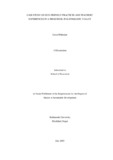
Please use this identifier to cite or link to this item:
https://hdl.handle.net/20.500.14301/558| Title: | Case study on Eco-friendly Practices and Teachers’ Experiences in a Preschool in Kathmandu Valley |
| Authors: | Maharjan, Leeza |
| Citation: | Maharjan, L.(2025).Case study on eco-friendly practices and teachers’ experiences in a preschool in kathmandu valley |
| Issue Date: | Jul-2025 |
| Publisher: | Kathmandu University School of Education |
| School: | SOED |
| Department: | DODE |
| Level: | Masters |
| Program: | KUMSD |
| Abstract: | The early childhood period is the main factor that determines the development of sustainable values and environmentally friendly habits. Nevertheless, the practice of environmental education in Nepalese preschools is very limited and not yet explored. The research intends to reveal the truth about eco-friendly practices in a preschool environment in Kathmandu Valley through the views of early childhood educators. It studied the application of eco-friendly practices in the early childhood sector and the ways that teachers include children in environmental learning activities. It also investigated the challenges faced during the implementation of eco-friendly practices. Data is collected through in-depth interviews and classroom observations with six teachers from a Montessori preschool using a qualitative case study design. Thematic analysis is done to explore teachers' views, pedagogical approaches, and the contextual aspects that affect eco-friendly practices. The results reveal that the teachers are motivated and creative while implementing eco-friendly practices through the normal everyday activities in the classroom, which include waste separation, planting, and use of materials. Most of students are very active in these activities and display a gradual learning of environmental responsibility. Challenges arise due to inadequate training, substandard curriculum integration, lack of infrastructure, and limited involvement of parents. The findings suggest that the key to the success of eco-friendly education is teacher training, the coordinated integration of curricula, and the establishment of family and community partnerships. Teacher backing would imply that even minor daily activities can turn into the habit changing building blocks and hence the continuity of environmental awareness for a lifetime. It is essential to familiarize the young children with the eco friendly learning aspect in their daily practices to make them environmentally responsible from the very beginning. |
| URI: | https://hdl.handle.net/20.500.14301/558 |
| Appears in Collections: | Research Project |
Files in This Item:
| File | Description | Size | Format | |
|---|---|---|---|---|
| WCC_Leeza Dissertation.pdf | 356.46 kB | Adobe PDF |  View/Open |
Items in DSpace are protected by copyright, with all rights reserved, unless otherwise indicated.